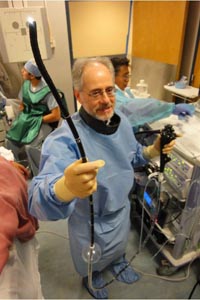New Equipment Allows Internists to Reach Final Frontier

Zuckerman will perform single balloon enteroscopy with Mohamed Othman M.D., assistant professor of internal medicine at the Paul L. Foster School of Medicine.
The Paul L. Foster School of Medicine’s Division of Gastroenterology, Department of Internal Medicine, has achieved a series of important milestones in a short amount of time. First by expanding their GI motility services, then by introducing endoscopic ultrasound and now by adding cutting-edge balloon assisted enteroscopy.
“It’s only been in the last few years that these endoscopes have come into wide spread use and we’re the first in El Paso to offer this procedure,” said Marc Zuckerman, M.D., professor of internal medicine at the Paul L. Foster School of Medicine.
Single balloon enteroscopy, also known as deep enteroscopy, uses a single balloon endoscope to gain better access to the hard-to-reach small bowel, commonly referred to by gastroenterologists as the final frontier of endoscopy.
This procedure allows doctors to take biopsies and to treat abnormalities they may encounter while exploring the small intestine, like bleeding, lesions and polyps.
“The community is very excited about having this technology available to them,” Zuckerman said. “We have already gotten referrals and we expect to have more as word gets out that this procedure is now available at University Medical Center.”
Prior to this procedure, doctors were enlisting wireless capsule endoscopy where a patient would ingest a capsule with a camera to gain access to the small intestine. While doctors could see into the entire small intestine, the old process was purely diagnostic.
Related Stories
Celebrating Veterans: TTUHSC’s General Martin Clay’s Legacy of Service and Leadership
From his initial enlistment in the Army National Guard 36 years ago to his leadership in military and civilian health care management roles, Major General Martin Clay’s career has been shaped by adaptability, mission focus and service to others.
Texas Tech University Health Sciences Center School of Nursing Named Best Accelerated Bachelor of Science in Nursing Program in Texas
The TTUHSC School of Nursing Accelerated Bachelor of Science in Nursing (BSN) program has been ranked the No. 1 accelerated nursing program in Texas by RegisteredNursing.org.
TTUHSC Names New Regional Dean for the School of Nursing
Louise Rice, DNP, RN, has been named regional dean of the TTUHSC School of Nursing on the Amarillo campus.
Recent Stories
The John Wayne Cancer Foundation Surgical Oncology Fellowship Program at Texas Tech University Health Sciences Center Announced
TTUHSC is collaborating with the John Wayne Cancer Foundation and has established the Big Cure Endowment, which supports the university’s efforts to reduce cancer incidence and increase survivability of people in rural and underserved areas.
TTUHSC Receives $1 Million Gift from Amarillo National Bank to Expand and Enhance Pediatric Care in the Panhandle
TTUHSC School of Medicine leaders accepted a $1 million philanthropic gift from Amarillo National Bank on Tuesday (Feb. 10), marking a transformational investment in pediatric care for the Texas Panhandle.
Texas Tech University Health Sciences Center Permian Basin Announces Pediatric Residency Program Gift
TTUHSC Permian Basin, along with the Permian Strategic Partnership and the Scharbauer Foundation, Feb. 5 announced a gift that will fund a new pediatric residency.
